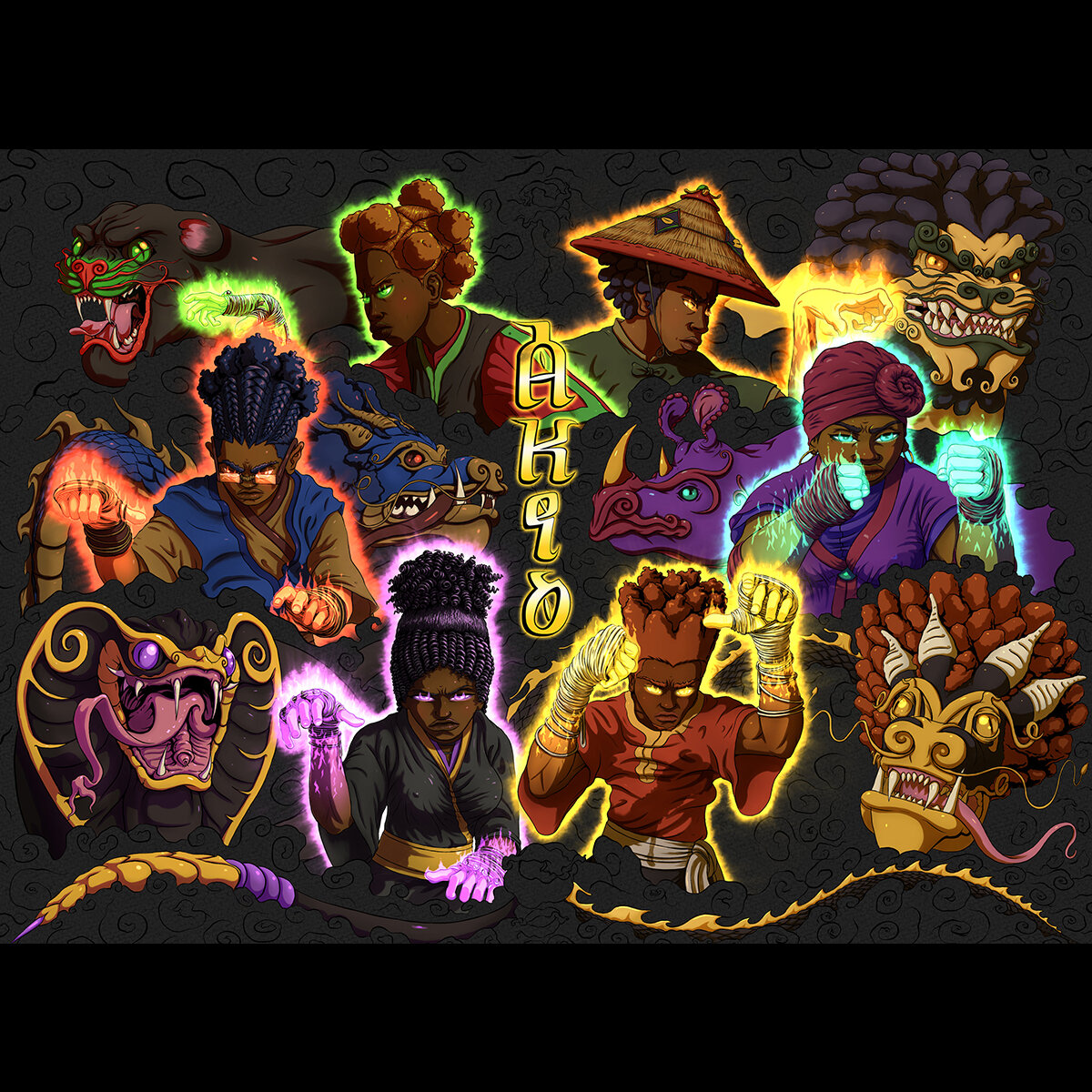
AKIO
Interview by Arhantika Rebello
Images courtesy of Curtly and Christian
A Black-Owned Martial Arts based Manga by Curtly Ferguson and Christian Barnett from Dreambaked
The age of Martial Arts is coming to an end. The darkness of the shade has engulfed the land of Dalos, smothering the light of the spirit.
“Akio is the youngest surviving member of the legendary Dragon Clan. The clan, among many other Martial Arts clans, were once revered by the peoples of Dalos and beyond. Now they are but a shadow of their former glory. Destroyed, scattered and suppressed by the Imperial Monarchies, who now engage in perpetual warfare between each other unchecked.”
For readers wanting to get a better insight into the story, what’s the premise?
Akio was the youngest living member of the fractured Dragon clan. A naive, but strong, 19 year old. He lived with his grandfather Saruwatari, hidden outside of the corrupted central kingdoms of Dalos. But one day while he was honing his clan’s martial arts style, an intruder attacked.
The assailant was after a specific gemstone that plays an important role in the fate of Dalos. But how did he know where to find them? And how did he know about the gem?
In search of answers, Akio risks life and limb. The more he uncovers about the war for knowledge amongst the 7 kingdoms the more questions he needs answered. The journey leads deep into a conspiracy that involves his family and reaches to the upper echelons of society In every kingdom of Dalos.
How is manga different to other comics and why did you choose this art form?
For us, manga is different because of how it’s read and how the story is formed and told. It brings out a certain level of imagination within the reader and takes them to that world. We also think manga is told in a unique way be it down to how the panels are laid out or reading it right to left. We picked this art form because as far as we see it know one draws the same as we do so it helps to not have anything similar and at the same time we stand out.
What inspired you to create Akio?
Curtly - The idea for Akio started from the fact I did martial arts and gained my black belt. I would often read and watch old Chinese martial art films so that combined with watching and reading anime, inspired the idea for Akio. So I sat in my room one day and wrote down every single thing I wanted to put in Akio and started working from there. While writing down all my ideas I was thinking about how in manga, there isn’t a lot of representation of black people , so I thought it would be lovely to have the manga based on black people.
Talk to us a bit about the process of creating Akio!
Curtly - Overall it took about 3 years, however, this is the 5th year we’ve been doing it. As I said before it started from me sitting in my room for the whole day putting down everything I wanted to include in Akio. Within those 3 years, the ideas came from understanding how we wanted the story to be told and how we wanted the reader to view it. It was a lot of late nights and continued editing to get to the final product. I have about 5 books that are filled with Akio work, down to the giant spider diagram, bullet points of an arc, and a small paragraph of what’s going to happen which then transitions to storyboarding, putting in grammar, angles, body positions, fight scenes, how many panels are needs then editing those of need be and finally drawing up the finished version. A lot goes into creating a manga and until the late nights and continue editing we never understand why it how difficult it really was.
What do you want Akio to represent for your audience?
Our goal for Akio is for people to enjoy a good read, however we’ve included certain views of the world from Akio’s perspective.. Each arc in Akio is based on real-world dilemmas, problems, situations and occurrences. It shows how we as people view these things and what our responses are. This could be a way of changing peoples perspective on certain everyday discussions and allowing the reader to immerse themselves in the world of fantasy. We also believe that having a diverse cast of characters, most of them being black, is positive for young children growing up. For them to see representation of their own colour, heritage or background can install a confidence in themselves to believe that they too can do what they strive for and that not all black people have to be sports players, rappers or any of the other stereotypes.








